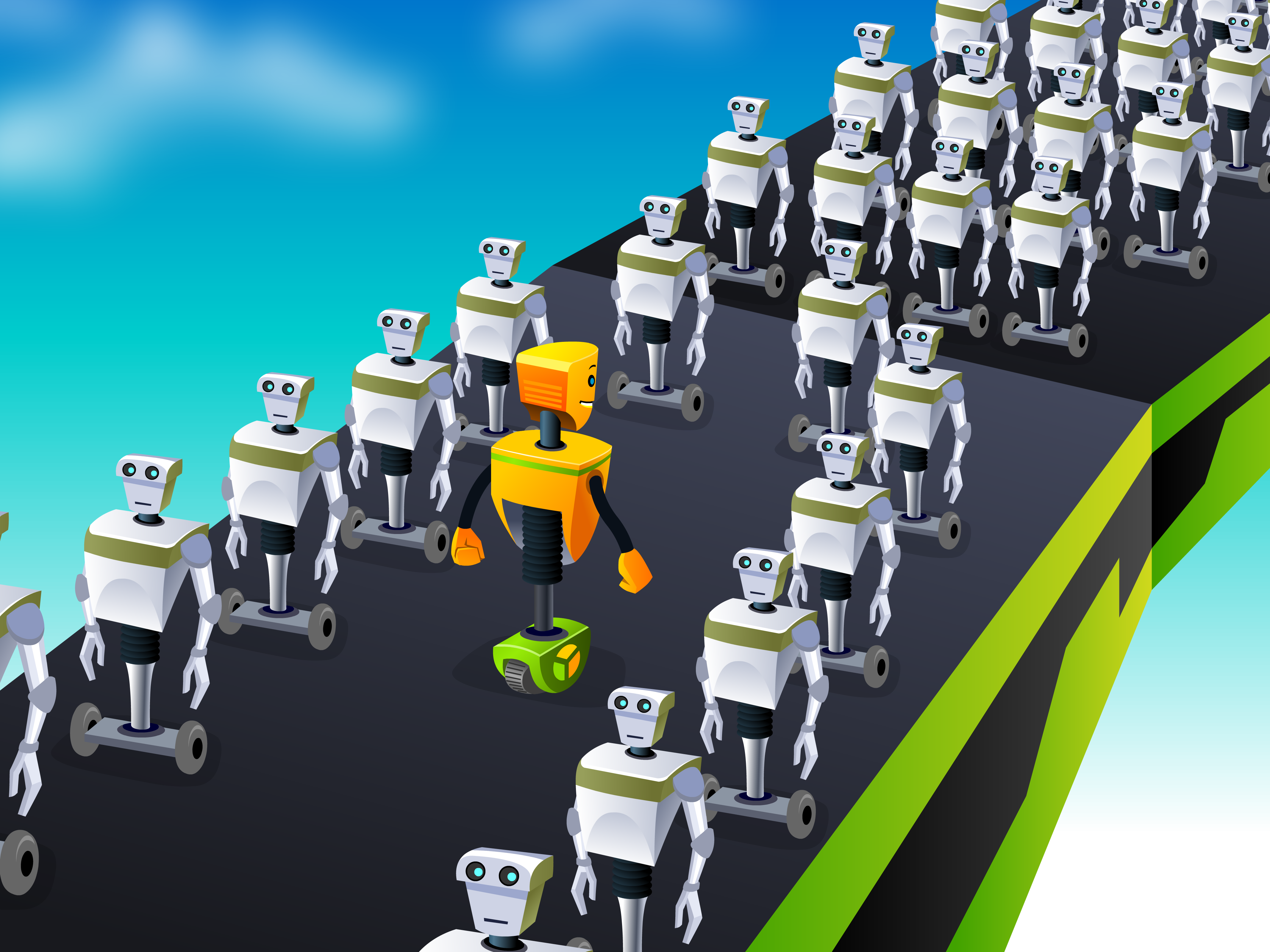
Modernize capabilities with Cognitive Computing
To ensure society benefits from technology in the future, organizations must lead in innovation and be able to keep scaling by bringing together innovative ecosystems of businesses, universities, and governments.
Their leadership depends upon their ability to stimulate novel research and continually generate innovative and transformative breakthroughs in advanced science and technology, including artificial intelligence.
Many organizations, taking advantage of these innovations, are continuously improving their processes either by modernizing or rationalizing the way they operate. Digital transformation has played and is still playing an important role. For example, many activities that were performed by people have been automated and are now performed by machines.
But today, within organizations, most of the processes that involve human intelligence are executed by people and cannot be easily modernized using traditional technologies. The use of artificial intelligent software solutions is seen as a key business transformation driver.
But what is intelligence? How can it be defined? Intelligence is a “human” thing mastered by cognitive psychologists, has neurophysiological foundations, manipulates semantic knowledge, and can be best defined by people’s capacity to represent, understand, reason, make decisions, and solve problems. However, the artificial intelligence industry has moved in a different direction by using mathematics, statistics, and computer sciences to replicate human intelligence processes within a machine and make it artificial. Today, in 2024, this approach has not provided the expected outcomes, and nearly 85% of the current AI implementations failed, according to Gartner.
We do it different

At Aeteos™, since 2016, cognitive sciences have been the proper knowledge domains to consider to make machines more intelligent. We have spent the last 7 years on research and development and created a new generation of artificial intelligence able to replicate how the brain works and capable of performing tasks usually requiring human intelligence. Our vision is that business processes that require human intelligence can be executed by people and machines, and what we do is called cognitive computing.
McKinsey
For McKinsey, cognitive computing is imbued with the ability to simulate human intelligence and efficiently process fuzzy data and problems. It is also essential for data analysis and decision-making. Specifically, cognitive systems are information systems that contain the cognitive hallmarks of learning, inferring, deducing, and computing.
KPMG
For KPMG, by enabling computer systems to replicate human capabilities, cognitive computing technology is building a future where humans and machines coexist and enable businesses to streamline business processes, improve operational performance, make faster, informed decisions, and augment organizational productivity.
Deloitte
For Deloitte, cognitive technologies’ impact on organizations will help leaders make wise strategy and technology choices. Because cognitive technologies extend the power of information technology to tasks traditionally performed by humans, they can enable organizations to overcome prevailing trade-offs between speed, cost, and quality.
To make machines smarter, we believe the first step is to understand how the brain works, and psychology, neuroscience, and linguistics are the key ingredients that must be used.
Our ability to reason, make decisions, and solve problems can define intelligence. These cognitive processes are linked to psychological functions such as emotions, sentiments, or needs. These mental states provide additional context-related key insights, which, once added to other available inputs, will create a conglomerate of information. This will provide us with a mental representation of the situation, enabling our awareness and adapting our behaviors and actions.
Making machines smarter will require that these human capabilities be transferred to and executed by a machine. This is the exact purpose of cognitive computing: to provide machines with the capacity to represent a context, understand a situation, reason, and take action.
Aeteos™ will help and direct the sponsoring organization (Governments, Universities, Businesses) to accelerate the adoption of cognitive computing and provide them with a pragmatical and proven approach, from concepts to implementation, to define a vision and show where it needs to head over the next five to ten years, clarify and define a sustainable overall approach and direction they will take to deliver value and achieve competitive advantage in the businesses and industries in which it chooses to participate. Our objective is to empower them to reduce external dependencies by providing recommendations and sharing our knowledge and expertise in cognitive computing so that they can maintain their prestige, be more attractive, promote excellence, reinforce sovereignty, and be in a position to lead the competition.
Our approach
The purpose of the diagnosis stage is to evaluate the sponsor’s goals in the overall context of cognitive computing technologies adoption and to develop a high-level understanding of current technological standards in which the sponsoring organization operates, as well as an understanding of particular strengths and weaknesses, with three main objectives: ensure that the sponsoring organization’s goals and strategies are reasonable, given his technological maturity; validate that the organization’s stated goals create value; and identify/quantify specific value-creating opportunities for the sponsoring organization to pursue to set the stage for a change journey and define a value proposition.
To develop and balance realistic assessments of internal factors that affect the sponsoring organization’s potential to achieve its goals, the diagnosis should identify and refine which goals and opportunities add value and can be achieved by the organization (organization’s willingness and capacity to change). In this sense, a comprehensive diagnosis can prevent the sponsoring organization from pursuing opportunities that it cannot capture and can steer the sponsoring organization toward opportunities having the highest value (Return on Invested Capital) and the strongest likelihood of being realized, setting common expectations of what “success” will look like.
We have already identified 47 business use cases that can be modernized using Percipion™, our cognitive computing software engine, helping professionals with the following capabilities:
Cybersecurity
Digital crimes are constantly increasing, in particular due to the evolution of the growing dematerialization of society. Percipion™ can be used by cybersecurity experts, law enforcement agencies, and forensic analysts to assess websites, blogs, forums, online games, messaging apps, SMS, documents, emails, or social networks to find digital evidence, better identify perpetrators, understand criminal behaviors, and catch the bad guys. For more information, click here!
Marketing and customer experience
Percipion™ can be used to understand better and take care of the customer needs and perception by assessing the voice of the customer material (feedback, surveys, claims) and provide insights that can be shared across the enterprise to build a portfolio of critical marketing metrics, helping organizations to drive growth, understand how customers perceive your company’s brands, products, and services, improving customer acquisition, engagement, retention, and loyalty while staying ahead of customer churn and dissatisfaction. For more information, click here!
Sales and commerce
Percipion™ can be used to assess aggregated customer data to empower sales professionals to gain a comprehensive understanding of prospective deals by providing sales teams with data-driven psychological insights about the quality of the client relationship and better support deal qualification and drive growth. For more information, click here!
Talent and organization
For a successful talent management, human resources can use Percipion™ to identify the right people to fill critical roles and assess reviews or performance evaluations providing them with key insights related to the workforce to boost productivity, identify risks and minimize attrition. For more information, click here!
